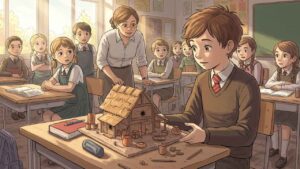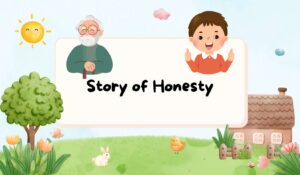Short Stories in English: Welcome to a wonderful collection of 10 short stories in English which beyond time and culture, each with profound morals and memorable quotes.” Within these stories are timeless lessons about life’s complexity, values, and the human experience.
Each story is a fabric of wisdom, resilience, and the beauty of moral principles that invites you to imagine, learn, and be inspired. look into this treasure trove of stories that promise to spark thought, give useful lessons, and leave a lasting impression on the soul.

The Wise Farmer
Once upon a time, an old farmer named John lived in a serene countryside. He owned a small piece of land where he diligently worked every day. One day, his horse ran away. Neighbours sympathized, but John remained calm, saying, “Who knows what’s good or bad?”
Days later, the horse returned, accompanied by a majestic stallion. The neighbours rejoiced, but John said, “Who knows what’s good or bad?”
Soon after, John’s son rode the new stallion, fell, and broke his leg. The neighbours expressed sorrow, but John maintained his composure, saying, “Who knows what’s good or bad?”
Not long after, a war broke out, and all able-bodied young men were drafted, except John’s injured son. The neighbours, realizing the wisdom in John’s words, marvelled at his foresight.
Moral: The story of the wise farmer teaches us that what seems unfortunate at first may be a blessing in disguise. Accepting situations without judgment and trusting that life unfolds as it should can lead to unexpected positive outcomes.
Quote: “Difficulties in life are often blessings in disguise. Trust the process, for what seems like a setback today may be the setup for a greater success tomorrow.”
The Two Wolves
In the heart of the forest, an old Cherokee grandfather imparted wisdom to his grandson. “Inside every person, there are two wolves constantly in battle. One is evil—anger, envy, greed. The other is good—kindness, empathy, peace.”
The young boy asked, “Which wolf wins?”
The grandfather smiled and replied, “The one you feed.”
Understanding dawned upon the boy as he realized the power lay within. He decided to nurture the good wolf within himself, fostering kindness and positivity.
Years passed, and the boy grew into a man known for his compassion and generosity. He recalled his grandfather’s lesson, understanding the impact of his choices.
Moral: Our actions and thoughts determine our character. By nurturing positive qualities within ourselves, we shape our destiny and influence the world around us.
Quote: “Feed the good within you, for what you nurture will grow. Your choices sculpt the path to your destiny.”
The Stonecutter
In a quaint village, there lived a humble stonecutter named Kai. Despite his hard work, Kai often yearned for a life of wealth and power. One scorching day, as Kai chiselled rocks, he saw a procession of the king and his courtiers passing by, adorned with lavish garments and accompanied by servants.
Overwhelmed with envy, Kai muttered, “Oh, how I wish I were the king!” To his amazement, his wish was granted, and Kai found himself adorned in royal attire, seated on a magnificent throne.
Basking in his newfound authority, Kai felt invincible. Until one day, a scorching sunbeam pierced through the palace windows, making him sweat profusely. He envied the sun’s power and, in an instant, transformed into the blazing sun, scorching everything in its path.
As time passed, a cloud emerged, blocking the sun’s rays. Kai, now the sun, wished to be the cloud. His wish was granted, and he transformed into a mighty cloud, raining upon the earth, flooding rivers, and shaping the landscapes.
Yet, when a strong wind blew, dispersing the clouds, Kai yearned to be the wind. Once again, his wish was granted, and he became the powerful wind, capable of uprooting trees and altering nature’s course.
One day, while blowing fiercely, the wind encountered a stubborn mountain, unaffected by its force. In awe of the mountain’s resilience, Kai wished to become the mountain. And so, his wish was granted.
Content as the immovable mountain, Kai realized the true essence of power lay not in constant change but in embracing one’s unique strength and resilience.
Moral: The story of the stonecutter teaches us the importance of contentment and accepting oneself. True power comes from being comfortable in one’s own identity rather than constantly desiring what others possess.
Quote: “Contentment brings immense strength, for the one who is at peace with themselves holds the ultimate power.”
The Butterfly’s Lesson
In a lush meadow, a caterpillar gazed at the sky, dreaming of flying freely like the butterflies. Over time, the caterpillar spun a cocoon, undergoing a profound transformation. Finally, it emerged as a beautiful butterfly.
Delighted with newfound freedom, the butterfly flew joyously, exploring the world with vibrant wings. One day, it noticed a caterpillar inching along the ground and, feeling superior, said, “I used to be just like you.”
The caterpillar looked up in awe and replied, “Is that so? I envy your ability to fly.”
Soon after, a strong gust of wind blew, carrying the butterfly off course and onto the ground. It struggled to fly as the caterpillar watched, offering assistance.
As the butterfly realized its vulnerability, it understood that its wings were a gift but not a measure of superiority. Both creatures possessed unique strengths, and humility was the greatest virtue of all.
Moral: The story of the butterfly teaches us that humility is essential. Recognizing our strengths and weaknesses while respecting others’ abilities leads to true greatness.
Quote: “In embracing humility, we discover the strength in acknowledging our own vulnerabilities and respecting the capabilities of others.”
The Tale of Two Frogs
In a serene pond nestled among greenery, two frogs, Ribbit and Croak, lived contentedly. One day, they overheard a farmer discussing his plans to drain the pond. Alarmed, Ribbit cried, “We must find a new home!”
Croak, however, remained composed. “Let’s wait until the situation arises,” he suggested.
Days passed, and the farmer returned, draining the pond. Ribbit, in panic, hopped from place to place in search of refuge. Croak, on the other hand, calmly found a nearby well, hopping in without fuss.
Ribbit struggled to find a new home, facing hardships along the way. Meanwhile, Croak adapted effortlessly to life in the well, enjoying its new surroundings.
One rainy day, the pond filled again, and Ribbit returned, joining Croak in the well. “How did you remain so composed during the crisis?” Ribbit asked.
Croak smiled. “Reacting without understanding the situation only leads to chaos. It’s better to adapt wisely and stay calm in the face of uncertainty.”
Moral: The story of the frogs emphasizes the importance of adapting wisely to change and staying composed in the face of uncertainty.
Quote: “In times of uncertainty, staying composed and adapting wisely paves the path to stability.”
The Old Man’s Lessons
In a quaint village, an old man named Thomas imparted wisdom to the village children. He handed each child a tiny seed and said, “This seed holds the power of growth within.”
Each child was instructed to plant and nurture the seed. In due time, vibrant flowers bloomed from the seeds, except for one child, Emily, whose seed did not sprout.
Emily felt disheartened and approached Thomas, expressing her disappointment. Thomas smiled and said, “Come with me.” He led her to his garden, showcasing diverse plants and trees.
“See, Emily,” he said, pointing at a tall oak tree. “It took years for this tree to grow, yet it stands strong and proud.”
He continued, “Your seed may not have sprouted, but it doesn’t diminish your potential. Patience, perseverance, and nurturing your strengths are as important as quick growth.”
Emily understood that her journey might take time, but with patience and dedication, she would flourish in her unique way.
Moral: The story of the old man teaches us the value of patience, perseverance, and nurturing our strengths. Growth takes time, and everyone flourishes at their own pace.
Quote: “Patience and perseverance are the seeds of success. Nurturing our strengths and embracing our unique journey leads to fulfilling growth.”
The Blind Man and the Lamp
In a small village, there lived a blind man named Jacob. One moonless night, while he sat outside his house, a traveller passed by, noticing Jacob in darkness. The traveller handed him a lamp, saying, “This lamp will brighten your world.”
Grateful for the gesture, Jacob lit the lamp every night, feeling its warmth and comfort. One day, a mischievous child remarked, “Why do you light a lamp when you can’t see?”
Jacob smiled and replied, “This lamp may not grant me sight, but it brightens the path for others who can see. Its light brings safety to passersby, guiding them through the darkness.”
Despite his inability to see, Jacob’s lamp illuminated the path for those around him, spreading warmth and safety throughout the village.
Moral: The story of the blind man and the lamp teaches us that even if we cannot benefit directly from something, our actions can still have a positive impact on others. Small gestures of kindness can illuminate the lives of those around us.
Quote: “A kind gesture may seem small, but its impact can brighten the darkest of moments for others.”
The Fox and the Grapes
In the heart of a lush orchard, a sly fox spotted a cluster of ripe, juicy grapes hanging from a vine. Eager to indulge, the fox leapt and tried to reach them but failed. Undeterred, it attempted repeatedly, each time in vain.
Frustrated and unable to grasp the delectable fruit, the fox scoffed, “Those grapes are probably sour anyway!”
Disappointed, the fox turned away, convincing itself that what it desired wasn’t worth the effort.
Moral: The story of the fox and the grapes illustrates the concept of sour grapes, wherein we tend to scorn what we cannot attain. It teaches us that dismissing something out of reach solely due to our inability to achieve it is a form of self-deception.
Quote: “Beware the tendency to disparage what we desire but cannot attain. True determination and effort often lead to the most satisfying rewards.”
The Tale of the Caravan Travelers
In a bustling town, a caravan of travellers journeyed through the desert. Among them were merchants, entertainers, and families seeking new opportunities. As they ventured, they encountered a wise elder who offered them a challenge.
The elder presented a large jar filled with stones and asked the travellers to add as many stones as they could to the jar. The merchants swiftly added larger stones, believing they’d filled the jar. However, the entertainer, using smaller pebbles, managed to fit more into the jar. The families, seeing little space left, poured sand into the jar, filling every crevice.
The wise elder smiled, revealing the jar could still hold more. With a jug of water, the elder poured it into the jar, saturating the sand.
“The lesson,” said the elder, “is that life is like this jar. You may think it’s full, but there’s always room for more if you’re resourceful and creative.”
Moral: The story of the caravan travellers teaches us that innovation, resourcefulness, and adaptability expand our possibilities, even when things seem full or limited.
Quote: “In life, the truly resourceful see opportunities where others see limitations. Creativity and adaptability create room for endless possibilities.”
The Tale of the Persistent Ant
In an ant colony nestled near a grand oak tree, there lived a diligent worker named Anthony. One rainy day, the stream swelled, carrying away the colony’s food supply. Determined to save his fellow ants from starvation, Anthony embarked on a challenging journey to find new food.
Despite encountering obstacles like rushing waters and predatory creatures, Anthony persisted. He found a plentiful stash of food on the other side of the stream but struggled to carry it back.
Undeterred, Anthony sought help from other creatures. With the collective effort of a spider, a squirrel, and a bird, they transported the food to the colony, ensuring the ants’ survival.
Moral: The story of the persistent ant highlights the importance of determination and collaboration. Even in the face of adversity, persistence and seeking support from others can lead to success.
Quote: “Persistence coupled with collaboration unlocks solutions to challenges that seem insurmountable. Together, we can achieve what seems impossible alone.”







